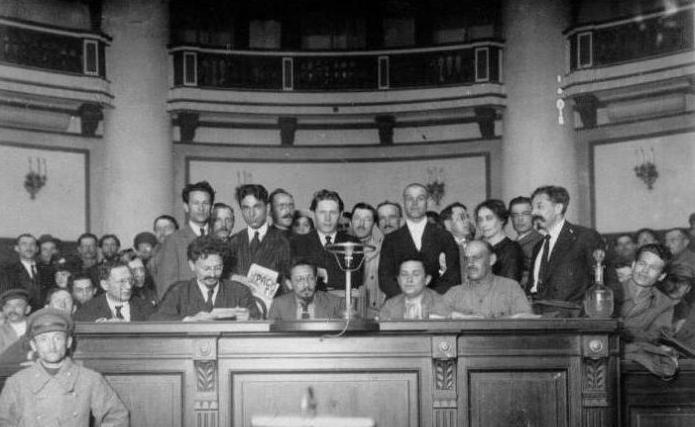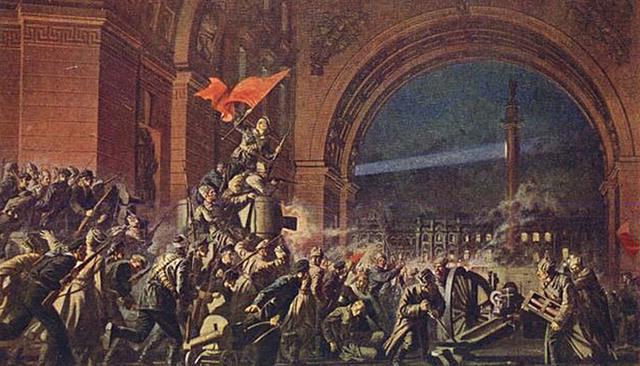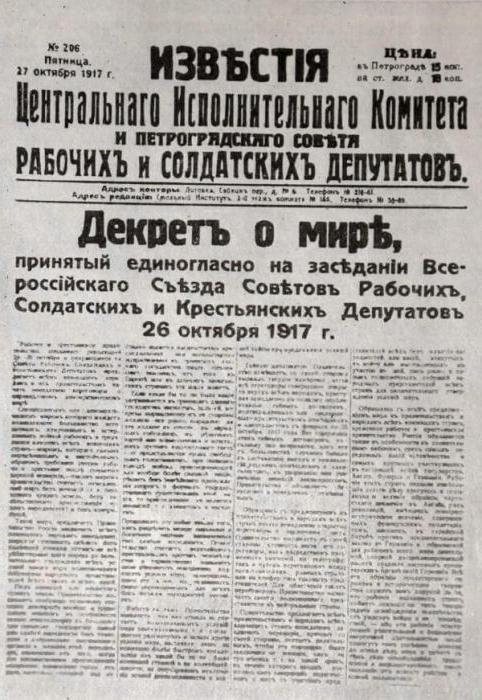The beginning of the work of the 2nd Congress of Soviets, the opening date of which was October 25 (November 7), 1917, coincided with the day of the armed coup committed by the Bolsheviks and radically changing the entire subsequent course of Russian history. That is why the documents of the Congress should be considered in the context of the historical realities against which they were adopted.
Russia in October 1917
The situation in Russia on the eve of the opening of the 2nd All-Russian Congress of Soviets was characterized by exacerbation of political instability, exacerbated by a series of defeats on the fronts of the First World War. During this period, the Provisional Government also did not show its best, delaying the convening of the Constituent Assembly ─ the legislative body for a long time, the purpose of which was to develop a constitution.
Only after lengthy delays were the elections of deputies scheduled for November 12th. At the same time, news came of the surrender of Revel and the capture by the Germans of the Moonsund Islands, located in the eastern part of the Baltic Sea, which posed an immediate threat to Petrograd and contributed to the escalation of tension in the capital. The prevailing situation was very cleverly used by the Bolsheviks.
The fight for mandates in government
The Second Congress of Soviets was the decisive stage in the struggle that the RSDLP (b) waged during the summer and fall of 1917 to obtain the majority of seats in the all-Russian Soviet bodies. By this time, they controlled the Moscow City Council, where the Bolsheviks owned 60% of the seats, and the Petrosoviet, 90% of which consisted of members of the RSDLP (b). Both of these country's largest local authorities were headed by the Bolsheviks. In the first case, V.P. Nogin was the chairman, and in the second, L.D. Trotsky.
However, in order to strengthen its position throughout the country, it was necessary to have most of the mandates at the All-Russian Congress, and therefore its convocation became a matter of paramount importance for the Bolsheviks. The main initiative to address this issue was taken by the Executive Committee of the Petrosoviet, which, as mentioned above, almost entirely consisted of the Bolsheviks, that is, of those who were vitally interested in the success of the planned business.
The tactical move of the Bolsheviks
At the end of September, they sent requests to 69 local Soviets, as well as to the committees of soldiers ’deputies in order to find out their attitude to the proposed congress. The survey results speak for themselves ─ of all the bodies surveyed, only 8 expressed their consent. The rest, under the influence of the Mensheviks and Socialist-Revolutionaries, who perfectly understood the reasons pushing the Bolsheviks to convene a congress, recognized such an initiative as inappropriate.
Lenin, who was aware that the political program put forward by the Mensheviks and Socialist-Revolutionaries, was more in the interests of the peasantry, really assessed the balance of forces and did not hope to receive more than a third of the mandates in the Constituent Assembly, and therefore was an opponent of its convocation. For their part, the Bolsheviks, anticipating the opening of the 2nd All-Russian Congress of Soviets, whose start date was not even discussed at that time, on their own initiative held in October 1917 1 Congress of Soviets of the Northern Region, which included the districts where the members of the RSDLP (b) had moment of numerical superiority in local government.
Intrigues to convene a congress
The official initiator of such a congress was a certain Committee of the Army, Navy and Workers of Finland - an organ that did not have official status and was never recognized by anyone. Accordingly, the meetings of the congress convened by him were held with flagrant violations. Suffice it to say that among his deputies were nominees ─ Bolsheviks who had nothing to do with the Northern Region and who lived in Moscow, as well as in other regions of Russia.
It was in the work of this deliberative body, the legitimacy of which is highly doubtful, that a committee was set up that began preparations for the 2nd All-Russian Congress of Soviets, which was so necessary at that moment to the Bolsheviks. Their activities were sharply criticized by representatives of former councils created after the February Revolution and consisting mainly of Mensheviks and Socialist Revolutionaries, who were preferred by the majority of the politically active population of the country.

The main opponents of the Bolshevik initiative were such socio-political organizations as the All-Russian Central Executive Committee, which had not yet lost its authority, of the 1st Congress of Workers 'and Soldiers' Deputies, held in June July of that year, as well as the executive committees of the army and navy. Their representatives openly stated that if the 2 Congress of Soviets takes place, it will only be an advisory body, the decisions of which will not receive legal force.
Even the official body of the Soviets, the Izvestia newspaper emphasized in those days the illegality of the actions taken by the Bolsheviks, and pointed out that such an initiative could come only from the executive committee of the 1st Congress. Nevertheless, the liberals did not have rigidity in defending their positions at that time, and the All-Russian Central Executive Committee gave its consent. Only the opening date of the 2nd Congress of Soviets was changed: from 17 it was postponed to October 25.
Beginning of the first meeting
The opening of the 2nd Congress of Soviets took place on October 25, 1917 at 22:45, just in the midst of an armed coup that began that day in Petrograd. Active participants in the events that took place on the streets of the city were many deputies who arrived from different cities of Russia. However, despite all the extreme circumstances, the congress meeting continued until the morning.
According to the preserved documents, at the time of opening, 649 deputies took part in it, of which 390 were members of the RSDLP (b), which obviously ensured the adoption of decisions favorable to the Bolsheviks. They received additional support from the coalition concluded at that time with the Left Socialist Revolutionaries, and thus had more than two-thirds of the vote.
The night of the Bolshevik coup
The opening date of the 2nd All-Russian Congress of Soviets has become fatal for domestic history. By the time the first speaker, who turned out to be the Menshevik F. I. Dan, had risen to the podium, almost all of Petrograd was already in the hands of the Bolsheviks. The only stronghold of the Provisional Government was the Winter Palace. As early as 18:30, his defenders were asked to surrender under the threat of shelling with the guns of the cruiser Aurora and a battery located in the Peter and Paul Fortress.

At 21:00, a blank shot was fired from the Aurora, then glorified by Soviet propaganda as “a symbol of the beginning of a new era in the history of mankind,” and two hours later, for more convincing, there were volleys from the fortress bastions. Despite all the pathos with which the storming of the Winter Palace was subsequently described, in fact, no serious clashes occurred. His defenders, realizing the senselessness of the resistance, went home by night, and the revolutionary sailors , led by the Bolshevik V. A. Antonov-Ovseenko, arrested the ministers of the Provisional Government who were left to their fate.
Scandals of the first day of the Congress
Conventionally, the first day, or rather, the night of the work of deputies can be divided into two parts. One of them, which took place even before the election of the presidium, was a series of protests by representatives of the moderate-wing socialist parties, expressing their extremely negative attitude to the military coup committed by the Bolsheviks.
The second part of the meeting is considered to be events unfolding after it turned out that the newly elected presidium almost entirely consists of the Bolsheviks and their allies, at that time ─ left Social Revolutionaries. Such a clear imbalance of forces provoked the departure from the hall of many representatives of the Mensheviks, the Right Social Revolutionaries, and also some other deputies.
In general, all the main decisions of the 2nd All-Russian Congress of Soviets were taken at the next meeting, also held at night, while on October 25 it was marked mainly by a major political scandal caused by events in the city. Those delegates of the Socialist Revolutionaries and Mensheviks who nevertheless remained in the hall after the departure of their party members attacked the Bolsheviks with reproaches for organizing an illegal coup. In addition, they openly accused their political opponents of numerous frauds, which provided them with the necessary selection of congress delegates.
Master of Bolshevik rhetoric
From the side of the Bolsheviks, the main defender of their position was L. D. Trotsky, who was an outstanding speaker and received the opportunity to show off his eloquence that day. His speech was filled with expressions that played the role of some clichés that were later disseminated by Soviet ideologists.
He talked a lot about how his party "tempered the energy and will of the working masses" and led the oppressed to rebellion, for which "no excuses are needed." He declared a crime any attempt to disrupt the work of the plenipotentiary representation of the workers and soldiers, which, according to him, is the Bolshevik party, and called on everyone to "fight back with the onslaught of the counter-revolution." In general, Trotsky knew how to attract listeners with his rhetoric, and his performances in most cases received the desired resonance.
Unhappy “child of the revolution”
At 2:40 a half-hour break was announced, after which the representative of the Bolsheviks Lev Borisovich Kamenev informed the congress participants about the fall of the Provisional Government. The only document adopted by the congress on that first night of his work was "Appeal to the Workers, Soldiers, and Peasants." It declared that in connection with the deposition of the Provisional Government, his power was transferred to the Congress. On the ground, from now on, management will be carried out by the Soviets of workers', peasants' and soldiers' deputies.
It is curious that L. B. Kamenev, who announced the victory of the uprising from the rostrum of the Congress, shortly before that was one of his ardent opponents. He did not change his position on this issue even after the Bolsheviks seized power. There is evidence that at a subsequent meeting of the Central Committee of the RSDLP (b), he allowed himself to very carelessly declare that "if you did stupidity and take power," then at least a suitable ministry should be drawn up. In a court in 1936, where he will be held as one of the participants in the Trotskyite-Zinovievsky center, he will be reminded of this long-standing statement and sentenced to death by the totality of “crimes”.

In general, the winged aphorism that “a revolution, like the god Saturn devours its children”, was born during the Paris Commune and belongs to one of its heroes ─ Pierre Verno, but it was in Russia that these words found their most complete confirmation. The proletarian revolution of 1917 turned out to be so “voracious” that the fate of the ill-fated Lev Borisovich was subsequently shared by almost the majority of the delegates of the 2nd All-Russian Congress of Soviets, the start date of which coincided with the day of her victory.
The second day of the Congress
In the evening of October 26, the next meeting began. On it, V.I. Lenin, whose appearance on the podium was greeted with general applause, read out two documents that became the basis of the decrees adopted by the 2nd Congress of Soviets. One of them, which went down in history under the title "Decree on Peace", was addressed to the governments of all the warring powers with an appeal to immediately conclude a truce. Another, called the "Decree on the land", dealt with the agrarian question. Its main provisions were as follows:
- All land that was previously privately owned was nationalized and became a public property.
- All estates, which were formerly the property of the landowners, were subject to confiscation and transfer to the disposal of the councils of peasant deputies, as well as land committees created on the ground.
- The confiscated land was handed over to the peasants for use according to the so-called egalitarian principle, which was based on consumer and labor standards.
- When cultivating the land, the use of wage labor was strictly prohibited.
Linguistic research of the Bolsheviks
It is interesting to note that during the work of the 2nd Congress of Soviets, the Russian language was replenished with the new term "people's commissar." He owes his birth to L. D. Trotsky, who later also became one of the "children eaten by the revolution." At the first meeting of the Bolshevik Central Committee, which took place the morning after the assault on Zimny, the question arose about the formation of a new government and how to name its members from now on. I did not want to use the word "ministers", because it immediately evoked associations with the previous regime. Then Trotsky suggested using the term “commissars”, adding the word “popular” to the occasion, and the government itself to be called the Council of People’s Commissars. Lenin liked the idea and was reinforced by the relevant decree of the Central Committee.
Formation of a revolutionary government
Another important decision at that time, adopted at the 2nd Congress of Soviets, was the signing of a decree on the formation of a new government, which should include representatives of workers and peasants. Such a body was the Council of People's Commissars, which performed the functions of the highest institution of state power, called upon to act until the convocation of the Constituent Assembly. He was accountable to Congresses of Soviets, and in the intervals between them to their permanent body ─ to the executive committee (abbreviated by the All-Russian Central Executive Committee).
There, at the 2nd Congress of Soviets, a Provisional Worker-Peasant Government was formed, which went down in history as the Council of People's Commissars. Its chairman was V.I. Lenin. In addition, the composition of the Central Executive Committee was approved, which included 101 deputies. Most of its members ─ 62 people were Bolsheviks, the rest of the mandates were distributed among the Left Socialist Revolutionaries, Social Democrats, internationalists and representatives of other political parties.